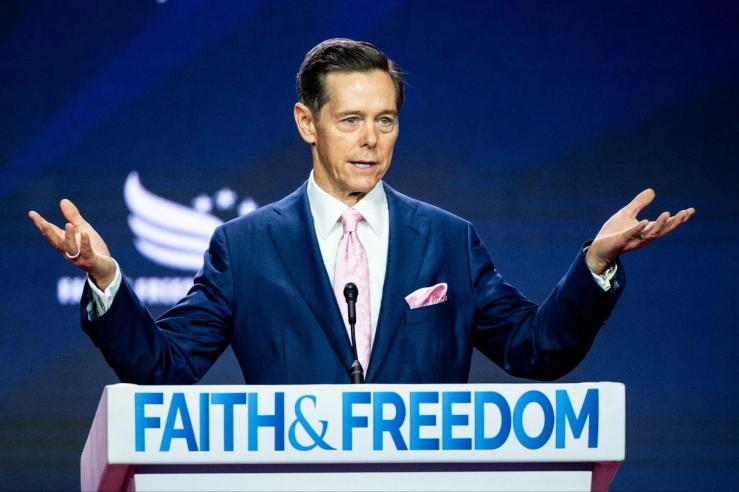The Scene
BUTLER, Pa. — Dozens of Trump-Vance signs littered yards in the middle-class neighborhood we rolled into on Friday morning. One home had a Harris-Walz sign. Faith & Freedom’s Pennsylvania Coalition Director Chris Merola, armed with an app developed for door knocking efforts and a pile of leaflets highlighting the presidential and senate candidates’ stances, gave out directions to three others who were out that day for the group, before himself setting off to knock on doors.
“We don’t tell them who to vote for,” Merola told me as we stood in front of one well-manicured lawn at the end of a cul-de-sac. “We feel by educating people and allowing them to make a more informed decision, that that’s a better approach than just telling them you have to vote for this [candidate].”
Republicans have been hand-wringing about Donald Trump’s ground game operation, with some in the party concerned about his campaign’s reliance on outside groups like Turning Point USA and Elon Musk’s America PAC that are working to identify and turn out infrequent voters. Often left out of those discussions? Ralph Reed’s Faith & Freedom Coalition, which is busy running a $62 million ground game operation.
“It’s a historic effort,” Reed told Semafor during a phone call interview last week. “It’s the largest and most ambitious and far-reaching ground game project by an organization outside the Republican party in history. And I think it’s going to make a big difference.”
While it can’t endorse due to its 501(c)(3) status, the group has long been active in grassroots efforts to drive religious conservatives to the polls, which has been core to get-out-the-vote efforts on the right for decades. Merola, who is on his fifth election cycle at Faith & Freedom, said that their “numbers speak for itself.”
The group seems just fine with being left out of the drama-filled news stories around competing get-out-the-vote operations. Reed said they’re “not spiking the football,” but are confident they’re outperforming their prior efforts and that conservatives will be able to match their liberal counterparts this year.
“We’re not letting off the gas at all, but so far, we’re doing a better job of delivering our vote,” Reed added. “Look at Nevada. I mean, I’m having a hard time figuring out where the evidence is that they have such a superior ground game. Did you find it anywhere? Because I can’t.”
In this article:
Know More
Faith & Freedom is active in every battleground state, but its most aggressive efforts are in Georgia, Pennsylvania, Arizona, and North Carolina. Nationwide, the group says it has surpassed 7 million door knocks, and expects to reach its goal of knocking on 10 million doors, or visiting around 18 million voters, by Nov. 2 — 20% of which will be minority households, accomplished in part by partnering with Hispanic evangelical pastors and churches.
In Pennsylvania, the survey the group conducts is simple, asking three questions: Does the individual plan to vote; what issue is most important to them this election from a list that includes the economy, border security, and pro-life issues; and whether they plan to vote in person, by mail, or by early voting. For the second question, Merola says most people they encounter this cycle name the border or the economy as their top issues.
“I’ve met people who are pro-life, people who are pro-choice or pro-abortion, but it’s not their number one issue,” according to Merola. “It’s the economy or jobs, it’s inflation, it’s the border, it’s immigration. Those are the big ones.”
The leaflet they hand out in Pennsylvania is double-sided, with one side comparing Kamala Harris and Donald Trump and the other comparing Senate candidates Bob Casey Jr. and Dave McCormick on issues like “federal abortion on demand law,” the “southern border wall,” “Medicare For All,” and “boys competing in girls’ sports.”
The canvassing I watched was neighborhood-based and only skipped homes where no one was listed as a registered voter. The area was red, but Merola said they were visiting Democrats, Republicans, independents, and even the occasional Green Party member — whoever they encountered.
One person who answered the door described himself as an independent, repeatedly saying that he wouldn’t reveal who he planned to vote for. Most of his criticism during the conversation, in which he said border security was the top issue, was directed at Harris.
“I will say — I won’t mention party or candidate — I think more people who are on the bubble in the center or who might be center-left are shifting more to the right than the opposite,” Merola said, citing his encounters at doors this cycle. “They believe that there’s a better opportunity to access the American dream. That’s where they’re at.”
Out in Pennsylvania, a state that both parties see as crucial in deciding the election, Faith & Freedom’s 350-plus staffers and volunteers are roughly 50,000 shy of reaching their goal of passing out 550,000 fliers in English, and are hoping to pass out 200,000 bilingual Hispanic versions by election day, according to Merola. In the post-COVID era, one big challenge is that people don’t want to answer their doors as often. (During my time shadowing Merola, one woman briefly spoke to us through her second-floor window. Many other door knocks went unanswered.)
Shelby’s view
Reed and his group declined to characterize other groups’ efforts, but they’re worth keeping an eye on: Republicans in general have expressed confidence about the election in recent weeks, and one of the only areas where that bravado has slipped, as we’ve reported previously, is when it comes to the ground game.
If Trump falls short, a big topic is going to be whether his turnout operation is to blame. Some of these newer, non-traditional operations are likely to face intense scrutiny — and the more traditional players with a longer track record, like Faith & Freedom, could be poised to say “I told you so.”
Room for Disagreement
Elon Musk has become somewhat obsessed with Pennsylvania, viewing it as key to winning the election, and is devoting significant time and resources to supporting Trump there. The New York Times reported earlier this month that Musk is “personally steering” his super PAC, which is powered by tens of millions of dollars from his own fortune, and he’s held a series of events around the state.
Notable
Donald Trump’s ground game has been making Republicans nervous for months, Semafor reported back in September, including the RNC’s commitment of significant resources to “election integrity” efforts. “What’s the point of watching the vote if you haven’t turned out the vote?” one Republican operative said at the time.
Around a quarter of door-knocks from Elon Musk’s America PAC have been flagged as being potentially fake in key states, according to reporting from The Guardian, underscoring the concerns in conservative circles about their involvement.


